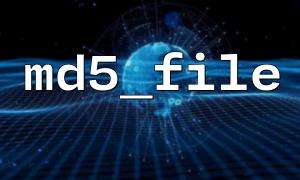In PHP, md5_file() is a very practical function to calculate the MD5 hash value of a file. Its basic syntax is as follows:
md5_file(string $filename, bool $binary = false): string|false
This function takes a file path as an argument and returns the MD5 checksum of the file (default is a string in hexadecimal format). However, many developers will encounter situations where FALSE is returned when using md5_file() , which often means that some errors have occurred. This article will analyze the reasons that may cause this situation from multiple perspectives.
This is one of the most common reasons. If the file path provided is incorrect, whether it is a typo, a wrong path format, or a directory that does not exist, md5_file() will fail and return FALSE .
Example:
$hash = md5_file('/path/to/nonexistent/file.txt');
Here, if file.txt does not exist, or the path is spelled incorrectly, FALSE will be returned.
Even if the file path is correct, md5_file() returns FALSE if the running user (usually a Web server user, such as www-data ) where the PHP script is located does not have permission to read the target file.
Solution:
You can make sure that PHP has sufficient permissions to read the file by changing the file permissions or the user you belong to.
chmod 644 /path/to/file.txt
chown www-data:www-data /path/to/file.txt
Some operating systems and file systems restrict other programs from reading the file when it is written or locked by other programs. In this case, if md5_file() tries to read the file, it may also return FALSE .
Example:
For example, a file that is being uploaded by FTP or written to another script, PHP may encounter read failure issues.
PHP's md5_file() theoretically supports using URL as parameter after enabled through the allow_url_fopen setting. But in fact, this method is prone to errors, especially when the remote server returns an error status code or the content is large and slow.
Example:
$hash = md5_file('https://m66.net/uploads/example.zip');
This code can only run successfully if allow_url_fopen is set to On . Otherwise, FALSE will be returned.
You can confirm the configuration in the code using the following method:
if (!ini_get('allow_url_fopen')) {
echo "Remote file access function not enabled";
}
Suggestion: Avoid relying on remote URLs. It will be safer to download the local temporary file through file_get_contents() first and then use md5_file() .
Although md5_file() can handle empty files, sometimes, if the file is truncated or corrupted (especially binary files), it may cause reading exceptions. This is not common, but file status can be detected manually by filesize() or fopen() + fread() .
When the file path contains non-UTF-8 characters (especially on Windows systems) or the path is constructed when uploaded by the user (such as Chinese, spaces, or special symbols), the path may be parsed incorrectly.
Example:
$hash = md5_file('/var/www/uploads/documentA.txt'); // Path encoding may be inconsistent
Using realpath() to circumvent such problems is a good way:
$path = realpath('/var/www/uploads/documentA.txt');
$hash = md5_file($path);
When using move_uploaded_file() , tmpfile() , or some automatically generated temporary path files, these files may be deleted, moved, or exceeded their lifetime during operation, causing md5_file() to fail when trying to read.














